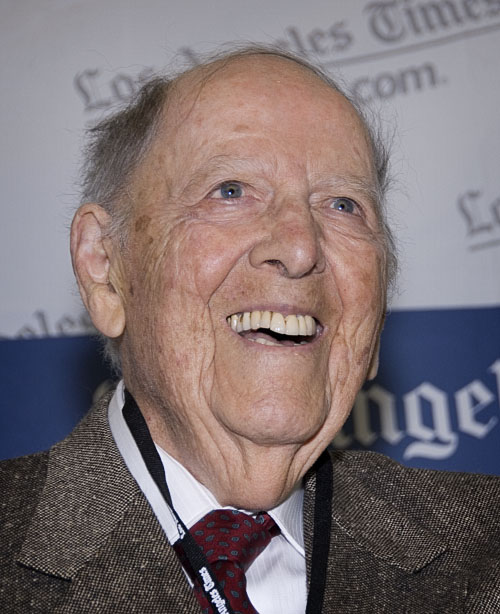
Herman Wouk attends the 2010 LA Times Festival of Books.
(RNS) Herman Wouk, author of “The Caine Mutiny” and “The Winds of War,” among other novels, celebrated his 100th birthday Wednesday (May 27). The good news is that he is still writing.
His new book, “Sailor and Fiddler: Reflections of a 100-Year-Old Author,” is due out in December.
Wouk’s writings reflect three dominant facets of his personality. The New York City native is a proud American who served four years as a U.S. Navy officer during World War II, a committed Orthodox Jew and a fervent supporter of the state of Israel.
Two of his most famous literary creations — paranoid Navy ship captain Philip Queeg and stage-struck Jewish teenager Marjorie Morningstar — are embedded in American culture.
Queeg is the one-word name given to psychotic leaders whose self-destructive actions demolish their lives. Humphrey Bogart portrayed the imploding Captain Queeg in the film “The Caine Mutiny.” Who can ever forget Wouk’s obsessive Navy skipper nervously rolling metal ball bearings in his hand as he seeks to discover and punish the person who allegedly stole his precious strawberries.
Marjorie Morningstar, played by Natalie Wood in the film of the same name, is the term used to describe a sexually developing adolescent seeking a glamorous stage career who falls in love with a cynical and callous older man — Gene Kelly in the film — even as her raging hormones preface a harsh introduction to adulthood.
Two novels — “The Winds of War” and “War and Remembrance” — tell the complex and catastrophic story of World War II and the Holocaust, among the most significant events in Wouk’s long life. Navy Commander Victor “Pug” Henry, the author’s omnipresent protagonist and alter ego, appears in almost every major event of the war.
In the widely viewed television adaptations of “Winds of War” and “War and Remembrance,” Robert Mitchum starred as Henry, the quintessential American “Everyman” who along with millions of other men and women defeats German Nazism, Italian fascism and Japanese militarism.
Whenever I am asked to recommend a history of the Holocaust and World War II, I suggest Wouk’s twin novels because of his meticulous research, attention to details and, above all, because of his thorough understanding of those extraordinary events and why they will remain a permanent part of human history.
In 1959 he published what may be his most lasting and influential book: “This Is My God,” a nonfiction work in which he affirmed his commitment to being a traditional Jew in the modern world. Wouk did not merely write about his “Jewish origins” or “Jewish background.” He described his commitment to a modern Jewish Orthodoxy that is engaged with the secular world.
Wouk’s religion affirmed traditional Judaism as a living vibrant faith. Because he was a successful author and not a rabbi or a professional theologian, his unapologetic attachment to Judaism attracted attention. It was as if the wartime Navy line officer and the bemused observer of female adolescence dramatically moved from Pulitzer Prize-winning fiction to an exploration and affirmation of his own spiritual life.

Rabbi Rudin is the American Jewish Committee’s senior interreligious adviser. His latest book, “Pillar of Fire: A Biography of Rabbi Stephen S. Wise,” will be published by Texas Tech University Press this fall. Photo courtesy of Rabbi Rudin
More than 55 years since its publication, “This Is My God” retains its place as a guidebook to Judaism and is read in synagogues, churches and schools because it is a vigorous exposition of personal faith and a “reader-friendly” explanation of Jewish beliefs, holidays and history. Despite its clear affirmations, Wouk wrote the book only after struggles with doubt and uncertainty.
Some literary critics have not been kind to Wouk. They say his “popularly written” books lack “gravitas.” They unfairly compare his World War II novels with Leo Tolstoy’s “War and Peace.” In such a contest, Wouk comes up short. But then, who can top Tolstoy?
Having lived an entire century, it may be good enough that Herman Wouk is, quite simply, Herman Wouk.
(Rabbi A. James Rudin is the American Jewish Committee’s senior interreligious adviser. His latest book, “Pillar of Fire: A Biography of Rabbi Stephen S. Wise,” will be published by Texas Tech University Press this fall.)
YS/MG END RUDIN




